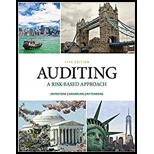
a.
Concept Introduction:
Independence Conceptual Framework- The AICPA had issued guidelines which should be followed in conducting an audit. One of these guidelines is independence framework that requires the covered members to be independent in conducting their audit.
Whether an auditor of publicly traded client needs to be independent.
b.
Concept Introduction:
Independence Conceptual Framework- The AICPA had issued guidelines which should be followed in conducting the audit. One of these guidelines is independence framework that requires the covered members to be independent in conducting their audit.
Whether an auditor of a privately held client needs to be independent.
Concept Introduction:
AICPA’s Code of Professional Conduct − AICPA has issued code of professional conduct which helps the auditors and AICPA members in the performance of their professional duties.
To explain:
The meaning of the given term.
c.
Concept Introduction:
AICPA’s Code of Professional Conduct − AICPA has issued a code of professional conduct which helps the auditors and AICPA members in the performance of their professional duties.
To provide:The difference between the given terms.
d.
Concept Introduction:
AICPA’s Code of Professional Conduct − AICPA has issued code of professional conduct which helps the auditors and AICPA members in the performance of their professional duties.
To provide:The details of services prohibited to auditors of publicly traded clients.
Want to see the full answer?
Check out a sample textbook solution
Chapter 1 Solutions
Bundle: Auditing: A Risk Based-approach, 11th + Mindtap Accounting, 1 Term (6 Months) Printed Access Card
- David Corp. manufactures 2 products, drills and wrenches. The company has estimated its overhead in the assembly department to be $200,000. The company produces 500,000 drills and 400,000 wrenches each year. Each drill uses 4 parts, and each wrench uses 5 parts. How much of the assembly overhead should be allocated to drills? Answerarrow_forwardProvide correct solution and general accounting questionarrow_forwardProvide correct solution and accounting questionarrow_forward
- Describe any one threat/risk in either the revenue cycle (i.e., in sales and cash collection activities) or the expenditure cycle (i.e., in purchases or cash disbursement activities)arrow_forwardNeed help with this accounting question not use aiarrow_forwardCan you please answer the financial accounting question?arrow_forward
 Auditing: A Risk Based-Approach (MindTap Course L...AccountingISBN:9781337619455Author:Karla M Johnstone, Audrey A. Gramling, Larry E. RittenbergPublisher:Cengage Learning
Auditing: A Risk Based-Approach (MindTap Course L...AccountingISBN:9781337619455Author:Karla M Johnstone, Audrey A. Gramling, Larry E. RittenbergPublisher:Cengage Learning Auditing: A Risk Based-Approach to Conducting a Q...AccountingISBN:9781305080577Author:Karla M Johnstone, Audrey A. Gramling, Larry E. RittenbergPublisher:South-Western College Pub
Auditing: A Risk Based-Approach to Conducting a Q...AccountingISBN:9781305080577Author:Karla M Johnstone, Audrey A. Gramling, Larry E. RittenbergPublisher:South-Western College Pub- Business/Professional Ethics Directors/Executives...AccountingISBN:9781337485913Author:BROOKSPublisher:Cengage



